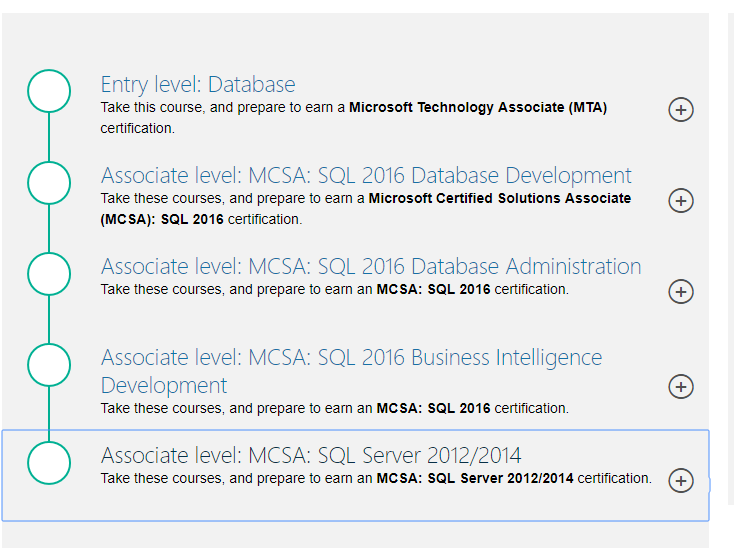
If you are new to IT you might start seeing the three letter word SQL thrown around in job descriptions and important roles. SQL is a huge part of many business infrastructures and learning what it is and why you use it can score you an amazing job. That’s why we created A Beginners Guide to SQL. In this guide you’ll find out what SQL is, how it’s used in the Information Technology Industry and why you should get certified in SQL! So scroll through A Beginners Guide to SQL and snag the dream job you didn’t know you wanted!
What is SQL?
You’ll hear the word Data or Database thrown about in IT settings from day one. A Database is simply a place where information is stored. SQL stands for Structured Query Language. Pronounced just like the letters SQL, it is a language used for relational database management systems. That’s a bit mystifying for the average user to understand.
Basically, SQL is an incredibly useful programming language that allows you to efficiently and powerfully work with databases. That means you can take the data (Information stored on a database) and do hundreds of different things. Whether it’s searching through 10,000 old documents for specific dates, organizing a system for efficient in-house staff management, looking for trends, or more. SQL is how you do that.
How does SQL help with this?
If you’ve used Excel or a similar spreadsheet program, you’ve experienced an entry level database. Information is stored in some manner (Often with tables, rows, and columns) and you can bring up specific data in the table through a manner of hotkeys or manual searching. Advanced Excel users can program cells to do specific functions like multiply cells together and more. They can also search in unique ways and merge documents together. The principles are similar for SQL based systems.
Outside of Excel you may have a unique dataset that requires being searched through, plugged into other programs, or even combined with automation. SQL is the powerful tool you’ll use to parse this data and use it effectively. We could spend hours walking you through the details OF SQL. For now just know that it is THE tool to help with Database management.
There’s a lot to learn with SQL so for a short deep dive in plain English, check out this right here!

Why learn SQL?
There are two main reasons to learn SQL. The first is the practical benefit that businesses need and love database management, in fact Data is one of the most important fields and as AI, Deep Data, and other fields are invested in, masters of database manipulation will have significant amounts of work to pursue! Companies grow and have more unique and important uses for data management than you can imagine. Behind the scenes companies use Data to keep track of clients, to discover trends, to solve problems.
The second reason is that SQL is very practical for any IT worker that needs to use a lot of data. As you learn to manage 30-50 workstations, need to run programs on numerous machines, or are working with an organization using CRM technology, you’ll want to know SQL. It can cut down on your personal work time as well as allow you to save the day when people need to find information fast and quick. With SQL you can help a company maintain and search records going back decades in just moments. Without SQL, you’ll have to manually search and waste a ton of time. It’s fantastic to be able to use SQL for in-house inventory lists and more as well.
What Type of Jobs Use SQL?
There are specific SQL based jobs as well as normal IT work like Systems Admin that’ll heavily benefit from the way SQL cuts down on time and allows automation. Most will work with running the background of an IT Business, some will specifically be working with large data to find results as well. Expect $70,000 or more for a qualified and experienced SQL tech. Whether it’s business analyst work or building a system, you’ll be compensated very well.
Are there any SQL Certifications?
Yes! Certification is a necessary step towards showing an employer you actually “get” a specific technology. There are a bunch of SQL certifications but we recommend using Microsoft as your first SQL Cert Vendor. They offer a large variety of certifications that all have to do with SQL and often update the certifications offered. Microsoft also has several in-house programs that use SQL and you’ll most likely be using those if you get involved with SQL.
The MCSA path for SQL will show an employer that you have serious knowledge and understand databases. Microsoft offers separate certifications for Database Development, Database Administration, and Business Intelligence Development. This is because SQL isn’t a one man operation. You might be making the database or you might end up parsing the data and updating the database. These certifications have specific focuses but don’t get hung up too much on that. Learning SQL is the most important aspect!
Simply select your certification, check out the requirements, take the necessary exams, and you are ready to roll! You can’t fake knowing SQL though so you’ll want to be very comfortable solving problems with it.

This is so useful but I’m a bit intimidated by learning SQL and getting a certification!
It’s totally natural to find certification overwhelming at first. In fact we think it’s wise to take a moment and ask yourself if the investment is worth it and what you’ll want. We’re convinced thought that SQL knowledge will take you to some amazing places. If you are unsure, we always recommend taking a moment and looking up an online practice exam! Websites like examtopics offer amazing expert designed practice exams that mimic the real-life certification for SQL and will show you what the certification entails knowledge-wise. Not only that, it’sMCSA 100% free. It’s an amazing resource and offers almost any cert imaginable. Perusing the exam a bit might show you what certification entails and calm your nerves! After all, learning SQL is hard, other-wise everyone would do it, but it’s worth it!
Hopefully after reading A Beginners Guide to SQL you got answers to some of the most common questions you encounter day after day. We love helping those in the industry learn the necessary things to make them A-list employees and get new careers that pay well. If this guide has helped you, please take a moment to like, comment, and subscribe! We hope you’ll come back and look around our site for some other unique articles on certification and wish you luck in your IT journey!

